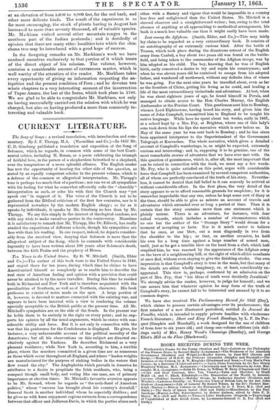Ten Years in the United States. By D. W. Mitchell.
(Smith, Elder and Co.)—The author of this book went to the United States in 1848, and stayed there for ten years, during which time he claims to have Americanized himself so completely as to enable him to describe the real state of American feeling and opinion with a precision that could never be attained to by the mere traveller. During this time he resided both in Richmond and New York and is therefore acquainted with the peculiarities of Southern, as well as of Northern, character. His book professes to consist of notes made on the spot. A large portion of it, however, is devoted to matters connected with the existing war, and appears to have been inserted with a view to rendering the volume specially acceptable to the British public at the present time. All Mr. Mitchell's sympathies are on the side of the South. In the present war he holds them to be entirely in the right on every point ; and he sup- ports his opinion by all the usual arguments, which he states with con- siderable ability and force. But it is not only in connection with -the war that his preference for the Confederates is displayed. He gives, for instance, a very unfavourable account of the political morality of the Americans ; but all his observations on this subject are directed ex- clusively against the Yankees. He describes Richmond as a very pleasant residence ; while New York is, according to him, a terrible place, where the murders committed in a given time are as numerous as those which occur throughout all England, and There "leaden weights are manufactured for the purpose of sinking bodies in the waters that flow round the city." The Anglophobia which prevails in America he attributes to a desire to propitiate the Irish residents, who, being a compact though small body, and voting like one man, are of primary importance at election times. Mr. Mitchell's favourite aversion appears to be Mr. Seward, whom he regards as "the arch-fiend of American politics," whose "success has brought about his country's downfall." General Scott is another individual whom he especially dislikes ; and he gives us with keen enjoyment copious extracts from a correspondence between that officer and Jefferson Davis, in which the parties abuse each
other with a fluency and vigour that would be impossible in a country less free and enlightened than the United States. Mr. Mitchell is a shrewd observer and a straightforward writer ; but, owing to the total absence of anything at all approaching to methodical arrangement, his book is a much less valuable one than it might easily have been made.






























 Previous page
Previous page